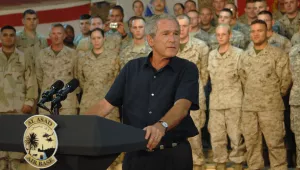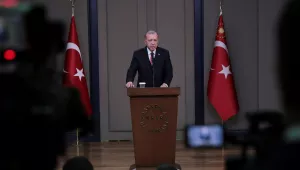Much of the debate in the United States over the war in Iraq has centered on the number of troops.
Many critics of the war, along with many who initially supported the war, contend that if we had only gone into Iraq with a larger number of troops, things would have turned out differently (and better), presumably because it would have brought more law and order to the country. This logic of sending more troops has now affected President Bush, who said that he will send about 21,000 more troops for a period of time, with the hope of squelching the sectarian violence in Baghdad as well as the insurgency in the western Anbar province.
The logic of the argument is flawed on several levels. It presumes that more U.S. troops (in a country of 23 million people, 6 million of which live in Baghdad) will somehow stop or at least put a lid on the sectarian violence that finds scores of tortured bodies every day in the capital city. The question is, how? Are those forces pitted in this vicious daily struggle of sectarian warfare going to be deterred by several thousand more American soldiers?
That is highly doubtful. Moreover, the hatred between the Sunni and Shiite gangs that are engaged in this bloodshed isn't going to dissipate anytime soon no matter what the United States does or does not do. Whether we like it or not, their settling of scores will be on a different timetable than ours.
These death squad gangs are linked to the Shiite and Sunni militias which, in turn, are linked to various political factions. Despite repeated calls by the United States on the new Iraqi government to disband the militias, nothing has been done. The Shiite-dominated government is clearly hedging its bets. If the country descends into full-scale civil war, it obviously does not want to be left defenseless. Many Shiite politicians see the Shiite militias as their protectors against a resurgent Sunni population, nothwithstanding Prime Minister Prime Nouri al-Maliki's pledge to crack down on the militias.
The other major flaw in the troop-number argument, which goes back to the beginning of the war, is the notion that we are in Iraq for the Iraqi people's welfare and that we are preventing Iraq from becoming a radical Islamist terrorist state. Bush stated this strongly on Wednesday.
But from the Iraqi side of the equation, particularly those of Arab Sunni background, the situation looks wholly different. From their perspective, the United States, like other powers before it, has invaded their country and toppled their government for the interests of an "imperial" design.
The sight of Western tanks rambling through their cities and towns brings back eerie images of British colonial domination.
The history of the modern Middle East is not so much a story about the Arab-Israeli conflict as it is about the peoples of the region yearning and fighting for their independence against foreign domination. Witness the Algerian war for independence, the Egyptian nationalist struggle against the British in the Suez Canal Zone in the 1940s and early 1950s, the Syrian nationalist agitation against the French in the 1920s and 1940s, and Iraq's own struggle against the British and the British-supported Hashemite royal family in the 1950s.
To insert ourselves militarily in a country and a region with this type of history and mythology was bound to cause problems and ignite an insurgency no matter what the troop number count. Although many Iraqis, particularly some Shia and Kurds, undoubtedly saw us as "liberators," most Sunni Arab Iraqis saw us and continue to see us as hated "colonial" occupiers.
Bush seems to think that insurgency is made up mostly of foreign jihadists and elements of Saddam's regime, when in reality the Arab Sunni insurgency is much broader and deeper than that.
Inserting more U.S. troops is unlikely to dampen the hatred against the U.S. occupation, and the more insurgents we kill, the more recruits the insurgents will gather from the dead insurgents' brothers, cousins and uncles. This cycle of violence will, in turn, lead to more U.S. casualties.
We are never going to win the hearts and minds of the Iraqis as long as we are in the country militarily, and no specific number of U.S. troops is going to change this situation.
Gregory Aftandilian is a research fellow at the Belfer Center for Science and International Affairs at Harvard's Kennedy School of Government and a former Middle East analyst at the State Department. He wrote this commentary for the Orlando Sentinel.
Aftandilian, Gregory. “Numbers Game Inconsequential.” Orlando Sentinel, January 15, 2007





